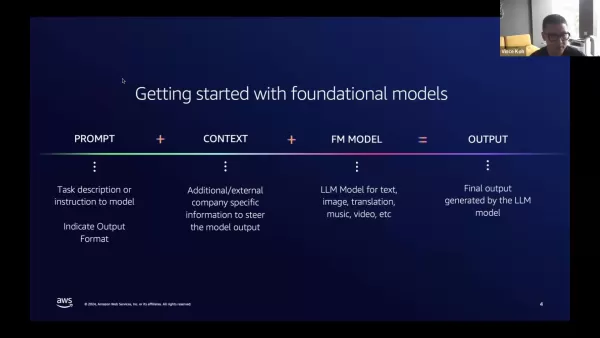AI-Powered Retail: Strategies and Real-World Applications
The retail sector is experiencing a profound shift, driven by breakthroughs in artificial intelligence (AI). From improving customer interactions to streamlining supply chains, AI is transforming the industry. This article explores effective strategies and practical uses of AI, machine learning (ML), and generative AI in retail, offering valuable insights for businesses aiming to innovate and boost customer engagement.
Key Highlights
AI and ML are revolutionizing how retailers connect with customers.
Generative AI opens new possibilities for tailored experiences and innovation.
Effective data use is essential for successful AI adoption.
Composable commerce enables flexible, scalable retail solutions.
Ensuring data privacy and security is critical for AI applications.
Retailers are using AI to equip employees for better customer service.
AI enhances every stage of the customer journey: discovery, selection, purchase, and post-purchase support.
The AI Transformation in Retail
Understanding the AI Ecosystem
Retail is no longer limited to brick-and-mortar stores. Digital commerce is advancing quickly.

This discussion begins by outlining the AI landscape. Grasping this ecosystem is vital. Generative AI is a pivotal technology enabling retailers to enhance a wide array of operations. To implement it effectively, retailers must understand its core principles.
Artificial intelligence (AI), machine learning (ML), and generative AI are reshaping retail. Each offers distinct capabilities, and leveraging them is key to staying competitive.
- AI includes techniques that allow machines to perform tasks requiring human-like intelligence.
- ML, a subset of AI, uses algorithms to learn from data without explicit programming.
- Generative AI pushes boundaries by creating original content, designs, and solutions.
Adopting these technologies can significantly improve retail operations, customer satisfaction, and innovation. The key is strategic implementation, distinguishing practical applications from mere hype.
AWS’s Role in Retail AI Solutions
Amazon Web Services (AWS) leads in delivering cloud-based tools for retailers.

Justin Hon Aman, Head of Worldwide Retail and Consumer Goods Industry Strategy at AWS, offers deep expertise to guide retailers through the AI landscape. AWS provides a robust set of tools to help businesses harness AI for innovation and global customer engagement.
- AWS delivers a versatile AI platform tailored to retail’s diverse needs.
- Retail Solutions: From predictive analytics to personalized recommendations, AWS equips retailers to stay competitive.
- Industry-Tailored Strategies: AWS helps retailers use AI to drive innovation and improve customer engagement.
AWS develops AI solutions addressing specific retail challenges, enabling innovation and stronger customer connections.
Critical Focus Areas for Retailers in 2024
Several key areas will shape retail success in 2024.

As of Q3 2024, the following trends are driving the retail industry:
- In-Store Technology: Enhancing employee and customer experiences in physical stores with advanced tech.
- Merchandising and Inventory Automation: Streamlining merchandising and inventory allocation for efficiency.
- AI, ML, Generative AI, and Edge Computing: Harnessing these technologies for advanced retail solutions.
- Workforce Empowerment: Equipping employees with tools for superior customer service.
- Supply Chain Optimization: Improving processes through integrated planning and execution.
- Immersive Customer Experiences: Building loyalty with engaging, personalized experiences.
- Composable Commerce and Digital Modernization: Adopting flexible commerce solutions and updating core systems.
- Flexible Operating Models: Implementing adaptable business operations.
- Sustainability in Operations: Prioritizing eco-friendly practices across the product lifecycle.
Privacy Compliance: Adapting to changing privacy regulations.
These trends highlight AI’s role in keeping retailers competitive and profitable.
Accelerating Innovation
Innovation is surging, fueled by advancements in multiple technologies.

These technologies are transforming the retail landscape:
- AI and Machine Learning
- Internet of Things (IoT)
- Cloud and Edge Computing
- High-Performance Computing
- Quantum Computing
- 5G Networks
Retailers must adopt these technologies to stay innovative and competitive. Integrating AI solutions enhances operational efficiency.
AI in the Customer Journey
AI Touchpoints
AI enhances multiple stages of the customer journey.

Retailers can apply AI in these key areas:
- Discovery: Customers find products through online ads, social media, or search engines, landing on pages with tailored recommendations.
- Selection: Product pages, reviews, and conversational shopping make information more accessible.
- Purchase: Customers add items to carts, check out, and complete payments seamlessly.
- Post-Purchase: Customers receive deliveries and access responsive support.
Vince Koh emphasizes that no single solution fits all retailers. Businesses must consider their unique needs and explore creative AI applications for maximum impact.
AI Shopping Assistants: Transforming Discovery
AI shopping assistants demonstrate AI’s transformative potential. Constructor, an AWS partner, makes this possible.
This conversational tool uses generative AI for personalized experiences, powered by:
- Amazon Bedrock
- Amazon ElastiCache
- Anthropic Claude (FM)
- Cohere (Embeddings)
This system creates style assistants, curating complete looks like outfit ideas and complementary items.
Generative AI in Retail Enterprises
Advantages
Creates original content, such as images, text, and designs.
Delivers high levels of personalization and customization.
Reduces reliance on human-driven content creation.
Boosts efficiency through automation.
Offers innovative, customer-specific solutions.
Challenges
Demands significant computational resources.
May produce unethical or biased outputs without proper oversight.
Requires ongoing refinement through feedback.
Data privacy and security concerns must be addressed.
May not always align with brand standards or customer expectations.
Frequently Asked Questions about AI in Retail
How does AI enhance customer engagement in retail?
AI personalizes recommendations, offers real-time chatbot support, and crafts targeted marketing campaigns. By analyzing customer data, retailers create tailored shopping experiences, boosting satisfaction and loyalty.
What are key considerations for implementing AI in retail?
Data privacy is critical. Retailers must use data ethically, with robust security measures. Integrating AI with existing systems can be complex, requiring employee training and seamless data compatibility.
How does generative AI differ from traditional AI in retail?
Traditional AI analyzes data for predictions or automation. Generative AI creates new content, like product descriptions or designs, enabling unprecedented personalization and innovation.
What is composable commerce?
Composable commerce allows businesses to build customized solutions by integrating capabilities from various vendors. Using Packaged Business Capabilities (PBCs), retailers can adopt flexible, scalable systems that meet their specific needs.
Related Questions about AI and Retail
What are the benefits of personalized marketing?
Personalized marketing enhances customer retention and brand loyalty through: Increased Engagement: Customers respond better to relevant content. Improved Conversion Rates: Tailored offers drive purchases. Enhanced Loyalty: Personalized experiences foster customer trust. Higher ROI: AI-driven campaigns optimize marketing spend. Data Insights: Personalized campaigns reveal valuable consumer behavior trends.
Related article
 Topaz DeNoise AI: Best Noise Reduction Tool in 2025 – Full Guide
In the competitive world of digital photography, image clarity remains paramount. Photographers at all skill levels contend with digital noise that compromises otherwise excellent shots. Topaz DeNoise AI emerges as a cutting-edge solution, harnessing
Topaz DeNoise AI: Best Noise Reduction Tool in 2025 – Full Guide
In the competitive world of digital photography, image clarity remains paramount. Photographers at all skill levels contend with digital noise that compromises otherwise excellent shots. Topaz DeNoise AI emerges as a cutting-edge solution, harnessing
 Master Emerald Kaizo Nuzlocke: Ultimate Survival & Strategy Guide
Emerald Kaizo stands as one of the most formidable Pokémon ROM hacks ever conceived. While attempting a Nuzlocke run exponentially increases the challenge, victory remains achievable through meticulous planning and strategic execution. This definitiv
Master Emerald Kaizo Nuzlocke: Ultimate Survival & Strategy Guide
Emerald Kaizo stands as one of the most formidable Pokémon ROM hacks ever conceived. While attempting a Nuzlocke run exponentially increases the challenge, victory remains achievable through meticulous planning and strategic execution. This definitiv
 AI-Powered Cover Letters: Expert Guide for Journal Submissions
In today's competitive academic publishing environment, crafting an effective cover letter can make the crucial difference in your manuscript's acceptance. Discover how AI-powered tools like ChatGPT can streamline this essential task, helping you cre
Comments (2)
0/200
AI-Powered Cover Letters: Expert Guide for Journal Submissions
In today's competitive academic publishing environment, crafting an effective cover letter can make the crucial difference in your manuscript's acceptance. Discover how AI-powered tools like ChatGPT can streamline this essential task, helping you cre
Comments (2)
0/200
The retail sector is experiencing a profound shift, driven by breakthroughs in artificial intelligence (AI). From improving customer interactions to streamlining supply chains, AI is transforming the industry. This article explores effective strategies and practical uses of AI, machine learning (ML), and generative AI in retail, offering valuable insights for businesses aiming to innovate and boost customer engagement.
Key Highlights
AI and ML are revolutionizing how retailers connect with customers.
Generative AI opens new possibilities for tailored experiences and innovation.
Effective data use is essential for successful AI adoption.
Composable commerce enables flexible, scalable retail solutions.
Ensuring data privacy and security is critical for AI applications.
Retailers are using AI to equip employees for better customer service.
AI enhances every stage of the customer journey: discovery, selection, purchase, and post-purchase support.
The AI Transformation in Retail
Understanding the AI Ecosystem
Retail is no longer limited to brick-and-mortar stores. Digital commerce is advancing quickly.

This discussion begins by outlining the AI landscape. Grasping this ecosystem is vital. Generative AI is a pivotal technology enabling retailers to enhance a wide array of operations. To implement it effectively, retailers must understand its core principles.
Artificial intelligence (AI), machine learning (ML), and generative AI are reshaping retail. Each offers distinct capabilities, and leveraging them is key to staying competitive.
- AI includes techniques that allow machines to perform tasks requiring human-like intelligence.
- ML, a subset of AI, uses algorithms to learn from data without explicit programming.
- Generative AI pushes boundaries by creating original content, designs, and solutions.
Adopting these technologies can significantly improve retail operations, customer satisfaction, and innovation. The key is strategic implementation, distinguishing practical applications from mere hype.
AWS’s Role in Retail AI Solutions
Amazon Web Services (AWS) leads in delivering cloud-based tools for retailers.

Justin Hon Aman, Head of Worldwide Retail and Consumer Goods Industry Strategy at AWS, offers deep expertise to guide retailers through the AI landscape. AWS provides a robust set of tools to help businesses harness AI for innovation and global customer engagement.
- AWS delivers a versatile AI platform tailored to retail’s diverse needs.
- Retail Solutions: From predictive analytics to personalized recommendations, AWS equips retailers to stay competitive.
- Industry-Tailored Strategies: AWS helps retailers use AI to drive innovation and improve customer engagement.
AWS develops AI solutions addressing specific retail challenges, enabling innovation and stronger customer connections.
Critical Focus Areas for Retailers in 2024
Several key areas will shape retail success in 2024.

As of Q3 2024, the following trends are driving the retail industry:
- In-Store Technology: Enhancing employee and customer experiences in physical stores with advanced tech.
- Merchandising and Inventory Automation: Streamlining merchandising and inventory allocation for efficiency.
- AI, ML, Generative AI, and Edge Computing: Harnessing these technologies for advanced retail solutions.
- Workforce Empowerment: Equipping employees with tools for superior customer service.
- Supply Chain Optimization: Improving processes through integrated planning and execution.
- Immersive Customer Experiences: Building loyalty with engaging, personalized experiences.
- Composable Commerce and Digital Modernization: Adopting flexible commerce solutions and updating core systems.
- Flexible Operating Models: Implementing adaptable business operations.
- Sustainability in Operations: Prioritizing eco-friendly practices across the product lifecycle.
Privacy Compliance: Adapting to changing privacy regulations.
These trends highlight AI’s role in keeping retailers competitive and profitable.
Accelerating Innovation
Innovation is surging, fueled by advancements in multiple technologies.

These technologies are transforming the retail landscape:
- AI and Machine Learning
- Internet of Things (IoT)
- Cloud and Edge Computing
- High-Performance Computing
- Quantum Computing
- 5G Networks
Retailers must adopt these technologies to stay innovative and competitive. Integrating AI solutions enhances operational efficiency.
AI in the Customer Journey
AI Touchpoints
AI enhances multiple stages of the customer journey.

Retailers can apply AI in these key areas:
- Discovery: Customers find products through online ads, social media, or search engines, landing on pages with tailored recommendations.
- Selection: Product pages, reviews, and conversational shopping make information more accessible.
- Purchase: Customers add items to carts, check out, and complete payments seamlessly.
- Post-Purchase: Customers receive deliveries and access responsive support.
Vince Koh emphasizes that no single solution fits all retailers. Businesses must consider their unique needs and explore creative AI applications for maximum impact.
AI Shopping Assistants: Transforming Discovery
AI shopping assistants demonstrate AI’s transformative potential. Constructor, an AWS partner, makes this possible.
This conversational tool uses generative AI for personalized experiences, powered by:
- Amazon Bedrock
- Amazon ElastiCache
- Anthropic Claude (FM)
- Cohere (Embeddings)
This system creates style assistants, curating complete looks like outfit ideas and complementary items.
Generative AI in Retail Enterprises
Advantages
Creates original content, such as images, text, and designs.
Delivers high levels of personalization and customization.
Reduces reliance on human-driven content creation.
Boosts efficiency through automation.
Offers innovative, customer-specific solutions.
Challenges
Demands significant computational resources.
May produce unethical or biased outputs without proper oversight.
Requires ongoing refinement through feedback.
Data privacy and security concerns must be addressed.
May not always align with brand standards or customer expectations.
Frequently Asked Questions about AI in Retail
How does AI enhance customer engagement in retail?
AI personalizes recommendations, offers real-time chatbot support, and crafts targeted marketing campaigns. By analyzing customer data, retailers create tailored shopping experiences, boosting satisfaction and loyalty.
What are key considerations for implementing AI in retail?
Data privacy is critical. Retailers must use data ethically, with robust security measures. Integrating AI with existing systems can be complex, requiring employee training and seamless data compatibility.
How does generative AI differ from traditional AI in retail?
Traditional AI analyzes data for predictions or automation. Generative AI creates new content, like product descriptions or designs, enabling unprecedented personalization and innovation.
What is composable commerce?
Composable commerce allows businesses to build customized solutions by integrating capabilities from various vendors. Using Packaged Business Capabilities (PBCs), retailers can adopt flexible, scalable systems that meet their specific needs.
Related Questions about AI and Retail
What are the benefits of personalized marketing?
Personalized marketing enhances customer retention and brand loyalty through: Increased Engagement: Customers respond better to relevant content. Improved Conversion Rates: Tailored offers drive purchases. Enhanced Loyalty: Personalized experiences foster customer trust. Higher ROI: AI-driven campaigns optimize marketing spend. Data Insights: Personalized campaigns reveal valuable consumer behavior trends.
 Topaz DeNoise AI: Best Noise Reduction Tool in 2025 – Full Guide
In the competitive world of digital photography, image clarity remains paramount. Photographers at all skill levels contend with digital noise that compromises otherwise excellent shots. Topaz DeNoise AI emerges as a cutting-edge solution, harnessing
Topaz DeNoise AI: Best Noise Reduction Tool in 2025 – Full Guide
In the competitive world of digital photography, image clarity remains paramount. Photographers at all skill levels contend with digital noise that compromises otherwise excellent shots. Topaz DeNoise AI emerges as a cutting-edge solution, harnessing
 Master Emerald Kaizo Nuzlocke: Ultimate Survival & Strategy Guide
Emerald Kaizo stands as one of the most formidable Pokémon ROM hacks ever conceived. While attempting a Nuzlocke run exponentially increases the challenge, victory remains achievable through meticulous planning and strategic execution. This definitiv
Master Emerald Kaizo Nuzlocke: Ultimate Survival & Strategy Guide
Emerald Kaizo stands as one of the most formidable Pokémon ROM hacks ever conceived. While attempting a Nuzlocke run exponentially increases the challenge, victory remains achievable through meticulous planning and strategic execution. This definitiv
 AI-Powered Cover Letters: Expert Guide for Journal Submissions
In today's competitive academic publishing environment, crafting an effective cover letter can make the crucial difference in your manuscript's acceptance. Discover how AI-powered tools like ChatGPT can streamline this essential task, helping you cre
AI-Powered Cover Letters: Expert Guide for Journal Submissions
In today's competitive academic publishing environment, crafting an effective cover letter can make the crucial difference in your manuscript's acceptance. Discover how AI-powered tools like ChatGPT can streamline this essential task, helping you cre

































